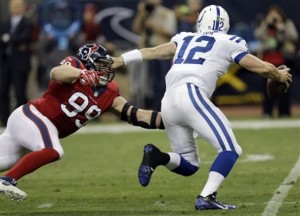A quick disclaimer: there are probably a zillion different ways to quantify quarterback help. This is certainly not not not the best way, but it’s the way that was easiest and most intuitive to me. On the scale of “this feels right” to “rigorous quantitative analysis” this certainly falls closer to the former end of the scale. But it’s Friday and we’re having fun, so here’s what I did.
1) Calculate how many standard deviations from average each team was in Points Allowed (negative means fewer points allowed).
2) Calculate how many standard deviations from average each team was in Pass Ratio (negative means more run-heavy).
3) Add the two standard deviations to see how much each team relied on each quarterback’s arm.
Here were the 2013 results. According to this, no quarterback was asked to do more than Matt Ryan. Here’s how to read the table below: The Falcons allowed 443 points last year, which was 1.05 standard deviations more than the average team. Atlanta also passed on 68.7% of all plays, which was 1.99 standard deviations above average. Add those together, and the Falcons get a grade of +3.04, the most in the NFL in 2013.
Again, this is a quick and dirty formula. Peyton Manning is obviously asked to do quite a lot, but because he was so good at it last year, Denver wound up throwing on “only” 60% of their pass plays. But I think this formula does do a decent enough job for our purposes: it says Wilson, Kaepernick, and Newton had the most help from their running games and defenses. And it says the Browns relied heavily on their quarterback, which is one reason why Cleveland finished 4-12.
Luck’s Colts ranked 19th last year in this metric, and 9th in 2012. I suppose what’s made Luck so widely-praised is the success the team has had despite asking him to shoulder such a large burden. You don’t come to this site to read about #QBWinz, but it’s pretty unusual for such a young quarterback to shoulder such a large burden and win a lot of games. I am the first to say that #QBWinz are stupid, but since it’s Friday and we’re having fun, let’s play around with some more numbers.
Since 1950, there have been 39 quarterbacks who have started at least 10 games in each of their first two seasons. [1](Note: I excluded Carson Palmer, Steve DeBerg, Jim Kelly, Joe Kapp, Joe Pisarcik, Tom Flores, Warren Moon, and Jeff Garcia, each of whom would otherwise qualify, since none of them were true … Continue reading For each quarterback, I calculated his QB Help score during his first two seasons along with his winning percentage. [2]Note: In the interest of time, I just took simple averages for both metrics. So Luck gets a QB Help score of +0.6 with a winning percentage of 0.688. Meanwhile, Wilson gets a Help Value of -8.5, but produced a winning percentage of 0.750. Not surprisingly, there’s a pretty clear inverse relationship between QB Help and winning percentage. But arguably no quarterback has balanced these two metrics as well as Luck. In the picture below, QB Help is on the Y-Axis, and winning percentage is on the X-Axis:

Let’s take those numbers in graphic form. Here’s how to read the table below. Luck’s first two years were in 2012 and 2013, and he went 22-10 (posting a 0.688 winning percentage). That’s the 3rd best winning percentage of the 39 quarterbacks in this sample. He had a QB Help grade of +0.6, which is the 18th highest number. If you average those two ranks — and averaging ranks is a terribly flawed idea, but I’m short on time and this is mostly made up stuff anyway — Luck has the lowest average rank in these two categories of any of the 39 quarterbacks.
As I wrote about last year, Wilson’s career has been extremely similar to Ben Roethlisberger’s through two seasons. Considering the QB Help for Wilson and Roethlisberger, it’s remarkable that Luck has the third best winning percentage of any quarterback in this group. Wilson and Roethlisberger had the two best records and the two highest help scores. The two quarterbacks who received the most help after them? Joe Flacco and Mark Sanchez.
References
| ↑1 | (Note: I excluded Carson Palmer, Steve DeBerg, Jim Kelly, Joe Kapp, Joe Pisarcik, Tom Flores, Warren Moon, and Jeff Garcia, each of whom would otherwise qualify, since none of them were true rookies during their first year. |
|---|---|
| ↑2 | Note: In the interest of time, I just took simple averages for both metrics. |

